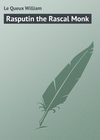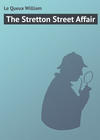Loe raamatut: «The Temptress», lehekülg 7
“Are you aware that Valérie and my late brother were acquainted?” Trethowen asked suddenly.
“How did you discover that?” exclaimed the artist in astonishment.
“Then you appear to know that she was a friend of his,” remarked Hugh dryly.
“No; I – it’s the first I’ve heard of it. Who told you?”
“I want to know whether it’s a fact or not,” persisted his friend.
“I don’t know,” he replied sullenly.
“You mean, you positively refuse to tell me?”
“No; it is inability.”
The two men continued their conversation for a short time longer, then Hugh left and returned to his chambers, not, however, before the warm friendship which had previously existed between them had been resumed.
That evening Jacob handed his master a telegram from Valérie. She had evidently made a sudden resolve, and had lost no time in carrying it into effect, for the message read —
“As you appear to doubt my explanation I have decided to leave England for the present. If you desire to write, a letter to 46, Avenue de la Toison d’Or, Brussels, will always find me.”
With a prolonged whistle he sank into his chair, staring aimlessly at the indistinct words on the pink paper which he held between his fingers.
He was half inclined to believe he had misjudged her.
Chapter Fourteen
On Cornish Cliffs
“Let us return now, Mr Trethowen. The night is chilly, and, besides, if we are too long, Jack – I mean Mr Egerton – will suspect us of whispering sweet nothings.”
“And if he does, surely there’s no harm, Dolly? He’s not jealous of you, he – I mean, it isn’t as if you were engaged to him.”
“No, that is so,” she replied; “he is such a prosaic old bachelor. Why, I assure you that ever since I have known him he’s never hinted at love. I am his model, his friend – that is all.”
“Do you know,” Trethowen said, after a few moments’ reflection, “I’ve often wondered, Dolly, how it is you have not married him.”
“Why should he marry me?” she asked in surprise. “I’m only an artist’s model, a woman who is looked down upon by fastidious prudes as immodest – yet the same women admire the pictures when in the galleries, and – ”
“But supposing he loved you?”
She shook her head.
“He does not,” she answered. “We are both Bohemians, and have many tastes in common. We found our ideas were similar years ago, when he was struggling for an existence in an attic and I was almost starving. Since that time to the present we have, in a pecuniary sense, shared one another’s lot. If I became his wife it is possible neither of us would be so happy as we are.”
But he only laughed, and said —
“He’ll ask you one day, and then perhaps you won’t refuse.”
“Don’t be absurd,” she protested, with a smile. “I am quite content as I am.”
Nevertheless, she heaved a slight sigh, and it was evident it was scarcely the truth she spoke.
Dolly Vivian had walked with him from the Hall to the outskirts of Bude, and they were now resting beside an old railing which protected the footpath along the edge of the high cliff.
The night was perfect. The light of the April moon flooded the valleys, illuminated the hilltops, and trailed along the plains of Cornish grass land in uninterrupted streams. The pale grey sea and pale grey sky were tinged with a faint blue; a few stars shone dimly here and there; the whole horizon was wrapped in mist, which took a tint of saffron-pink under the moon’s rim, and was slightly darkened where sea and sky converged. There was utter silence, a stillness that was complete and absolute, as if every one in the world had died, and even the waves lapping the beach below scarcely whispered.
They stood together, their faces turned towards the scattered glimmering lights of Bude.
A fortnight ago, Hugh, holding out prospects of good sketching, had prevailed upon Jack to visit him, and at the same time had invited Dolly. They had spent a pleasant couple of weeks together, and this was their last evening; for Egerton had an appointment with a lady, who had commissioned him to paint her portrait, and it was imperative that he should leave for London on the morrow. He had pleaded that his correspondence demanded attention, and thus it was that Dolly and Hugh had gone for a short ramble after dinner, leaving the artist writing in the library.
The pair had been silent for several minutes, entranced by the charm of the moonlit scene. Hugh had grown grave and thoughtful, for his companion’s emphatic protest puzzled him.
“Ah, well,” he exclaimed, at length, “I suppose sooner or later all of us will be married and settled, as the old ladies say.”
“You are speaking of yourself,” she remarked mischievously.
“No – I spoke collectively. Marriage or burial will be the lot of all of us – some sooner, some later.”
“Ah,” she exclaimed, as if suddenly recollecting, “you have not spoken of Mademoiselle Valérie. How is she? Do you often hear from her?”
“I had a letter a month ago. She was still in Brussels, and apparently in good health.”
“She has been absent some time now. When do you intend seeing her?”
“Soon – in a few days perhaps.”
“A few days,” she repeated thoughtfully. “Is she returning to London?”
“No; I have decided to travel back with you to-morrow, and then go on to Belgium.”
“You haven’t forgotten her, then?” she said in a strained, reproachful tone.
“Forgotten her!” he exclaimed. “Why should I?”
“It would be best,” was the brief reply.
The thought occurred to him that she loved him, and that jealousy had prompted her to utter that remark.
“Why?” he inquired, rather sharply.
“Mr Trethowen – Hugh, hear me,” she said imploringly, laying her hand upon his arm. “My friendship is as sincere towards you as towards Mr Egerton, but I cannot help telling you frankly what I think.”
“Well, and what are those fearful apprehensions of yours, Dolly?” he asked, regarding her with an amused expression.
“Forgive me for speaking so plainly, but I somehow feel confident that this foreign woman will bring you only sorrow and misery.”
“That’s cheering,” he remarked in his usual light and airy manner.
“Think seriously, and you will find I have some cause for apprehension,” she continued in earnest tones. “Remember Jack, your friend, has warned you. He has told you that she is not a fitting wife for you. Besides, are you not convinced that there is some strange secret tie between them?”
“You are right, Dolly. It is an enigma I cannot solve. Sometimes I have even thought that he is afraid of her,” Hugh said gravely.
“I feel sure he is. When she visited him on the first occasion they had high words, and though I could not understand, because they spoke in French, yet I’m absolutely certain she was threatening him.”
“It’s very curious,” he remarked, after a pause.
He was a trifle annoyed that she should have approached such a delicate matter so bluntly, although he was convinced more than ever that the woman who was speaking thus loved him.
“Why go to her? Why not remain here amid these lovely surroundings and try to forget her?” the girl suggested.
“Impossible! I love her, and will not hear her disparaged,” he replied, with more impatience than politeness, as he took a cigarette from his case and lit it. “Don’t speak again upon the subject, please; we shall never agree. Come, let’s turn back.”
Murmuring an apology, she drew herself up from her leaning position upon the low rail, and together they pursued their way in silence along the lonely path. As they walked, a cheerful freshness was in the air. The wind was hardly perceptible, because it blew off the shore and was lost in passing through the wood whose solemn shadows crowned the cliffside.
But while this exchange of confidence was in progress, Jack Egerton’s actions, viewed by even a casual observer, would have appeared strange.
As soon as Dolly and his host had departed, he rose from the writing-table, and, flinging himself into a chair before the fire, abandoned himself to reflections that appeared particularly gloomy. He sat almost motionless for fully half an hour, when Jacob entered with a letter.
“Whom is it for?” asked the artist.
“For the master, sir,” replied the old man, placing it upon the table, and retiring.
From where he sat, Egerton noticed a foreign stamp upon the envelope. He rose, and took it in his hand. A glance sufficed to tell it was from Valérie.
He turned it over and over, reading and re-reading the superscription.
“I wonder,” he said aloud, “whether it contains anything of interest?”
Then he turned towards the fire. There was a small copper kettle upon it, which had been ordered by Hugh to be brought up so that they might brew warm whisky. From the spout steam was issuing.
“Am I such a low, mean spy that I should contemplate opening my friend’s letters?” he asked himself at last. “Yet – yet it is not for my own benefit. Would Hugh ever forgive me if he knew all? If he knew my secret – ah! by heaven! it’s too horrible, the very thought of the crime, of its punishment, unnerves me. Coward – yes, coward at heart; afraid of justice, and under the thrall of a daring unscrupulous gang. What can I do, how can I act? Surely there can be no great harm in opening this.”
He stood several moments in silence.
“Yes!” he exclaimed suddenly, “I’ll do it!”
Then he held the envelope in the stream of steam. In a few moments the gum had become loosened, and he was reading the missive.
When he had finished it his face grew hard and stern. Slowly he replaced the letter in its envelope and re-gummed the flap in its original position. Standing before the fire, his arms folded, his head bent deep in thought, he muttered to himself:
“So that is your plan, Valérie! As a masterpiece of ingenuity and chicanery, it does you great credit, and fully sustains your reputation. But the bird is scarcely in the net yet. You have me under your merciless hand, it is true, and you know well that I dare not expose you, for you could send me to a convict’s cell, or worse. No, I am not such a fool as to run the risk. I know you and your brutal myrmidons too well for that. I cannot show you in your true colours, except vaguely, and therefore ineffectually; still we may be quits yet.”
Taking the lamp from the table, he placed it upon the old bureau wherein Hugh had found the strange letters and photograph.
“You gave me this to use in your interests,” he continued, taking a small key from his pocket. “I’ve searched for the missing letters. I’ve been a thief, because I’m compelled, like the cringing slave that I am. But how little you dream of what still remains! The most cleverly-arranged schemes are apt to fail sometimes.”
Inserting the key, he unhesitatingly opened the bureau. On pressing one of the dark panels of the side it fell forward, revealing a secret cavity, the existence of which Hugh had never discovered. All it contained was a slip of paper, together with an old copy of the Gaulois newspaper.
“Yes,” he said, aloud, “these will prove useful, perhaps, some day. They will be safer in my possession than here.”
Replacing the panel, he closed and locked the bureau, and, turning to the table, first read the words upon the piece of paper, then spread out the newspaper, and became absorbed in a long report which had been marked round with coloured crayon.
“And after all,” he reflected, when he had placed the papers in his pocket, “I may be only forging fetters for my own wear. Who knows?”
Then he sank back into his armchair, and, lighting his meerschaum, calmly smoked until the return of the pair who had been gossiping by the sea.
Chapter Fifteen
Queen of the Silent Kingdom
One of the most pleasant thoroughfares in Brussels is perhaps that broad boulevard, lying on the La Cambre side, between the Fontaine Debroeckère and the Porte de Hal. The Boulevard de Waterloo is scarcely as fashionable as the Bontanique or the Regent, but it certainly possesses another and greater charm, inasmuch as the trees are more abundant, and, being older than those in the other boulevards, their branches meet overhead, forming long avenues of dark foliage which in summer constitute a cool and pleasant promenade.
Hugh Trethowen, dressed with evident care, had strolled from his hotel in the Place Royale one afternoon, three days later, and, walking up the Rue de Namur, had turned into this leafy resort of idlers.
Under a clear blue sky the sun shone upon the fresh green of the spring foliage, lighting up the usually sombre pathways with a shimmering golden light, and presenting the boulevard at its best, with its crowds of flaneurs strolling under the old elms, or seated enjoying the exhilarating air.
But by Hugh the picturesqueness of the scene was unappreciated. He was too deeply absorbed in his own thoughts to notice the beauty or charms of his surroundings; he was only bent on finding the house Valérie had given as her address. Crossing the boulevard without scarcely giving it a glance, he found himself before a long row of tall houses which line the left side, and constitute the Avenue de la Toison d’Or. Their dead white fronts were the reverse of artistic, although their general character spoke of stability and wealth, for the majority were of almost stereotyped exactness, each with its wide porte cochère, its enormous door, its three tall drawing-room windows with white jalousies thrown back, and its four storeys above.
With little difficulty Hugh discovered that the house he was in search of was situated at the corner of the Place Louise, and that its façade was more imposing than that of its neighbours.
Meanwhile, seated on a low gypsy chair, in a small but elegant room, Valérie was deciphering a long letter which had been just handed to her by the man who sat near, Victor Bérard.
“Well, what do you think of it?” asked the latter, twirling the needle-like points of his moustache, as she folded the paper slowly and replaced it in the envelope.
“It only shows how very near he was to bungling – the idiot! If he had, well – the results would have been too dreadful to think of.”
“Matters are progressing as well as can be wished, and the disappearance has been accomplished excellently, with the exception of that one hitch – ”
“Which might have sent us both to a very unfashionable lodging,” she interrupted.
Nodding acquiescence, he replied —
“Sapristi! that’s all very well. But you have the money; you can’t grumble. Again, why need we fear the failure? You have beauty – indeed, you’re the best-looking woman in Brussels. As long as you retain that charm, we need not be apprehensive.”
“You pay me a pretty compliment, Victor,” she laughed. “Nevertheless, I must admit my face has always been my fortune.”
“And other people’s misfortune, eh?” observed her companion, smiling grimly.
“Well, that’s certainly one way of putting it, but you – ”
“M’sieur Trethowen desires to see mademoiselle,” Nanette said, for she had opened the door unobserved.
“Trethowen!” gasped Victor, twisting his moustache nervously. “He must not find us together.”
“No,” exclaimed Valérie. “Go quickly through the garden, and out by the side door.”
He had already put on his hat, and without further hesitation he waved his hand, and vanished through a door communicating with the conservatory.
“Au revoir,” he said. “You will know how to manage him, and I will return at six to take you to the Molière.”
She went to a long mirror and hurriedly arranged her hair; then, turning to the maid, ordered her visitor to be shown in.
“I wonder what his object is in coming here,” she muttered to herself, as she sank into her wicker chair, and commenced twisting her rings round her shapely fingers perplexedly. “Surely he cannot suspect! Yet the threats of that fool Egerton still ring in my ears,” and she frowned thoughtfully.
When her visitor entered she rose, calm and pale, to meet him.
“So you have returned to me at last, Hugh,” she said in a faltering voice, almost overcome with emotion.
“Yes, dearest,” he replied, placing his arm around her waist, and drawing her closely to him. “I have come to beg forgiveness for being so rash.”
“My forgiveness!” she exclaimed in a tone of surprise, looking up into his face. “Why, I have nothing really to forgive.”
“I judged you too hastily, Valérie, and, now I have learned the error of my ways, I have come over here to receive your pardon.”
“And I grant that freely,” she said, with a happy smile, for she was unfeignedly delighted that he had returned.
“Do you know,” he said, as he slowly released her, and sank into a chair beside her, “I’ve been unspeakably dull and miserable. By Jove! life hasn’t been worth living lately.”
“Why?” asked she naïvely.
“Because you have been absent.”
“I should scarcely have thought it,” observed mademoiselle mischievously. “You had Jack Egerton’s model. Surely she did not object to a mild flirtation?”
“Dolly Vivian! I flirt with her!” he echoed in surprise. “No, indeed, I’ve never done so. She is my friend, it is true; but nothing more.”
“Ah, don’t tell me that, Hugh. You men are all alike. A pretty woman’s face, a smile, a pair of merry eyes, and you are captivated.”
“But I have not been, except by yourself,” he declared, grasping her hand, and raising it reverently to his lips. “You do not know how blank and colourless my life has been without you – what an utterly miserable existence mine is when we are apart.”
He spoke low and earnestly, for all the fervour of the old love had returned, and, heedless of the warnings of his friends, he was repeating assurances of affection to the woman who held him in her toils for life or death. She did not reply, but, gazing trustingly into his eyes, her breast heaved convulsively.
“Tell me, shall we be the same to one another as before? Forgive me, and we shall live as if nothing had happened to mar our happiness,” he urged.
“Then, you really love me still, Hugh?” she asked, in a low, tremulous voice.
“Still love you? Yes; my heart and soul are yours. I care for no other woman save yourself.”
“Was it to be near me that you came here? Are you certain it was for no other reason?”
“No,” he replied, puzzled at her question. “Why do you ask?”
“Out of curiosity,” she stammered evasively. “I – I thought other business might, perhaps, have brought you here.”
Glancing round the apartment, and recognising the elegance with which it was furnished, he complimented her upon her taste.
“Yes,” she answered languidly. “This place suits me admirably. It is my home, and although I’m of a wandering disposition, and travel a good deal, I return here now and then to enjoy rest and obtain those comforts that are appreciable after hotel life. I am, perhaps, too cosmopolitan. Well, it is my failing. Since I was a girl, I have been accustomed to travel for pleasure, and I do so now in order to get life and variety, without which I don’t really believe I could exist.”
“Not if you were married?”
“Ah! possibly that would be different,” she said, with a rippling laugh. “I could then take some pleasure in my home, and my husband would be my companion, whereas at present I have only Nanette, my maid. You have little idea, Hugh, of the wearying monotony of the life of women who are alone in the world. We are utterly defenceless, and must either be prudes, and lead the existence of nuns, of, if we dare go about and enjoy ourselves, we are stigmatised as fast, and looked upon as undesirable and contaminating companions. I am unconventional; I care not a jot for the opinion of the world, good or bad; and, as a natural sequence, women – many of them notorious, though married – revile me unjustly.”
She uttered the words in all seriousness, and he felt compassion for her, as he knew well what she said was the truth.
“I can quite understand that your position is somewhat unenviable, Valérie; nevertheless, I have come here to-day to repeat the promise I made some time ago.”
“Your promise! Why – ”
“I love you dearly and will marry you, providing you will consent,” he added, interrupting her.
Her head sank upon his shoulder, and she burst into tears of joy, while he kissed her fair face, and smoothed her hair tenderly.
“I promise you,” he murmured, “if you become my wife you shall never regret. It is true, some say harsh things of you. I have heard gossip, but I’ve shut my ears to the lies of those who envy your good looks. In future, however, those who defame you shall answer to me.”
She lifted her face, wet with tears, to his, and their lips met in an ardent caress.
“Yes, I love you dearly, Hugh,” she declared, trying to subdue her emotion. “This day is one of the happiest of my life. If we are married, I swear I will be a true wife to you, notwithstanding the calumnies you have heard.”
Thus, after months of estrangement, Hugh Trethowen again fell an easy prey to her fatal power of fascination; and he, blind and headstrong, saw her only as a beautiful woman, who was unhappy, and who loved him. Yet it has been the same through ages. Men, under the spell of a daughter of Eve, a temptress who is more than passing fair, become weak and impressionable as children, and are ruled absolutely by the woman they worship, be she good or evil.
Until the sunset streamed into the pretty room, and the silver bells of the dainty ormolu clock chimed six, they sat together undisturbed. Many were the pledges of undying affection they exchanged; then he left, promising to call next day.
When he had gone, Valérie reseated herself, and gave herself up to one of those debauches of melancholy in which she sometimes indulged; for, after all, she was not entirely devoid of sentiment.
Could Hugh have overheard the conversation between Victor and the woman who was his affianced wife an hour later, he would, however, scarcely have congratulated himself upon the result of the interview.
Victor Bérard and Valérie were together in a hired brougham on their way to the Theatre Molière, where they had previously secured a box.
“So you are friends again, eh?” Victor was saying, laughing. “Well, I must congratulate you upon your wonderful tact and diplomacy. The manner in which you have acted in leaving him to follow you here has allayed suspicion, and as long as you can exercise your power over him, we have nothing to fear as to the ultimate success of our plan.”
“It was as good as a comedy,” declared she, laughing heartily. “I told him how lonely I was, and did the emotional dodge – squeezed a tear or two, just to add to the realism – and it brought him to the point at once. You should have been there; you would have been highly amused, for he’s such a believing idiot, that I can do just as I like with him.”
“You’re a clever girl, Valérie. With all your airs and graces, I believe you’d deceive the Evil One himself, if it was to your own interest to do so.”
“I don’t know whether to regard that as a compliment or not,” she remarked merrily, as she drew her opera cloak more closely around her shoulders, and leaned back in the carriage listlessly. “I suppose, however, from our point of view, the amount of deceit and craftiness I display in dealing with him will secure the more or less successful issue of our scheme.”
“If he knew everything, our position would not be a very enviable one, would it?”
“Scarcely. But, you see, my dear Victor, he doesn’t know all, and will not, unless Egerton peaches, which he dare not do on account of his own neck. Therefore, we are quite safe, and can negotiate the little affair without interruption.”
“I believe that you really care for the fellow a little – just a little,” her companion said, with a sarcastic laugh.
“And supposing that I did? I am my own mistress and can act as I please,” returned she, a trifle annoyed.
“Bien! you know best how to manage him, for you’ve had experience. I only urge you to be careful, and avoid any sentimental humbug.”
“Bah! I want none of your advice,” was all she replied, and a long silence ensued, which was not broken until the carriage drew up at the door of the theatre.




















